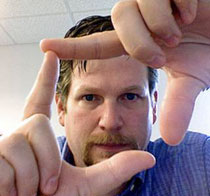 Guest post by Chris Brogan
Guest post by Chris Brogan
You are probably reasonably good at your job. I know this without knowing you, because you’re reading articles and blog posts that might offer you insight into how to up your game, how to improve your results, and this means that you’re already better than all those people who know what they know. Because of this, I want to offer you some thoughts from someone outside of your game.
You know how to be you in person. Translating that into your digital self is the next step. I don’t mean this in any weird video game way, or maybe I do, but let’s talk about that.
First, accept that everyone is connected
Doug liked Mitch Joel’s book, Six Pixels of Separation. He knew you could take advantage of it. Jonathan and Doug also read my book, Trust Agents, with Julien Smith. We talk about that, too, about how you’re nothing without your network. But now that we accept this, let’s realize that how we conduct ourselves online is every bit a reflection of how we are perceived, and that most people don’t have the first inkling of who you are offline, so they won’t realize your motivations, your nuances, and the like, without a bit of work.
Your digital self has to be human first
You can’t lead with a pitch. You can’t lead with a pounce. Instead, you have to take that step you know so well from the real world: get to know your prospective client. How do you get to know them? First, listen. What do I mean? If you Google the phrase, “grow bigger ears,” I’ve set out the steps for how to build a free listening station.
Listening is at the heart of all things that are worth a damn in the social web
It’s a way to find new prospects. It’s a way to help other people out long before they become prospects. It’s a way to keep your community warm. For instance if you spent 25% of your online time here’s what I’d do: search via Google BlogSearch and find out when people are blogging about starting a new job in that company in your town that’s hiring. If you scan Twitter Search, you’ll hear the chatter of someone scouting out a new neighborhood. It takes a little bit of tweaking, but finding out what people want is the best way in the world to help them. Think about it: you’re not pushing people to check out your listings or even visit your site. You’re listening to their needs and gently/politely responding. Piece of sweet cake.
You could do well to spend about 50% of your time on line connecting
And when I say this, I mean comment on local area blogs, spend time talking with folks on Twitter. Answer questions in LinkedIn that pertain to your locale or your special niche. Use these social web tools to connect and build relationships before you need them. Then, you’re top of mind when people are thinking about making a move. Connecting with people about themselves, on their turf, and not always about you is the “hamburger helper” of social media. It stretches out relationships and makes them more filling.
Finally, spend about 25% of your time on line publishing
By this, I mean consider posting blog posts, photos from Flickr, YouTube videos, and whatever else you think might help people achieve their goals (theirs, not yours). Make sure folks know how to work with you. Make a page about it. Make all your contact information visible. On your blog, make sure your “about” page has a photo of you: not that weird “Glamour Shots” photo they use on your signs and newspaper listings. Take a nice new candid photo. Not used to this? Get used to it. People want to see who they’re doing business with, and even more so on the web. You’re old? Who cares? You’re fat or toothless? No worries. Work with what you’ve got, but do it.
You might not have a decent blog. You might not have the first clue what to do next. You have a few options: look for a REBarCamp in your area. Put up a simple ad in Craigslist requesting help getting a blog set up. Work inside your network to figure out who can help. They don’t often cost much (unless you get all tricky with your design). Why? Because this can be a home base. It’s not always your selling space. But it’s always the place where people will get a better sense of who you are. That’s why you read Jonathan, right? Same thing.
By thinking of all this as an extension of who you are in the day to day, you’ll get closer to the mood and mindset required to do business with people via the social web. We’re not there to be sold to, but we do love when people help us buy. See the difference? To me, that’s the whole opportunity in a nutshell.
What do you think? What other advice would YOU add to this? How can you pitch in and extend the learning process of others in your space so that they can catch up to you?
—
Chris Brogan is the New York Times bestselling author of Social Media 101, available at bookstores everywhere. He is president of New Marketing Labs, LLC, and writes daily at Chrisbrogan.com




Pingback: Chris Brogan()
Pingback: Eric Brown()
Pingback: Evo Terra()
Pingback: Zna Trainer()
Pingback: LylePatterson()
Pingback: Real-TechGuy.com()
Pingback: Real-TechGuy.com()
Pingback: Jason B. Nelson()
Pingback: Real-TechGuy.com()
Pingback: Real-TechGuy.com()
Pingback: Real-TechGuy.com()
Pingback: Real-TechGuy.com()
Pingback: sedonakathy()